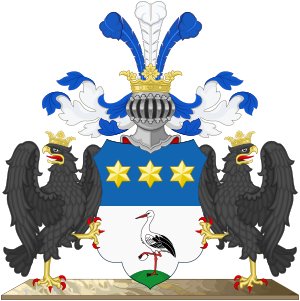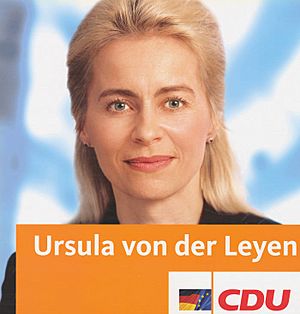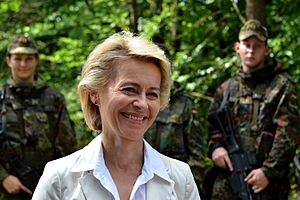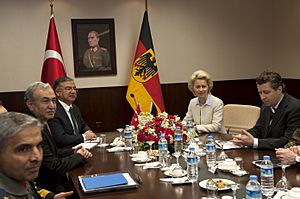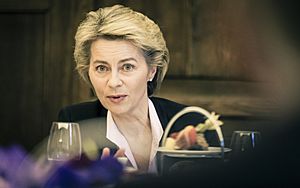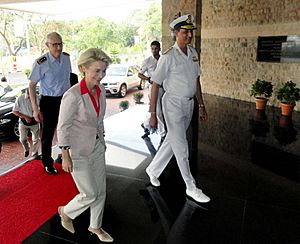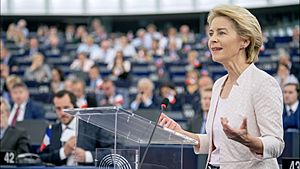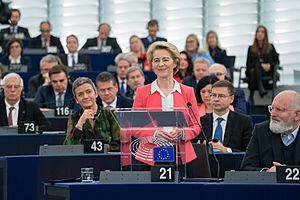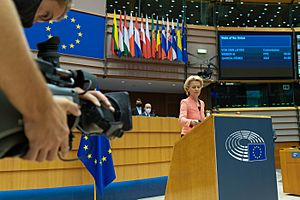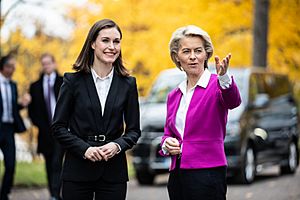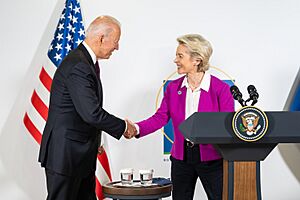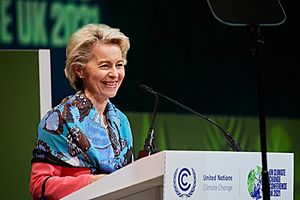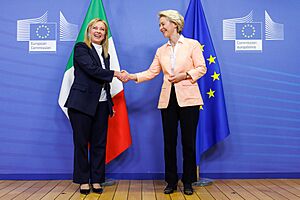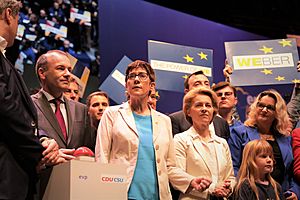Ursula von der Leyen facts for kids
Quick facts for kids
Ursula von der Leyen
|
|||||||||||||||||||||||
|---|---|---|---|---|---|---|---|---|---|---|---|---|---|---|---|---|---|---|---|---|---|---|---|
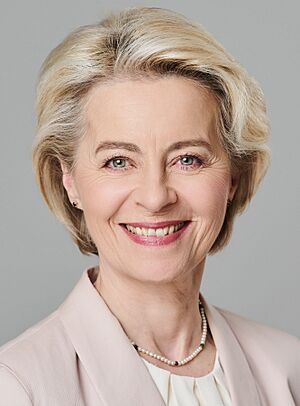
Von der Leyen in 2024
|
|||||||||||||||||||||||
| President of the European Commission | |||||||||||||||||||||||
| Assumed office 1 December 2019 |
|||||||||||||||||||||||
| Preceded by | Jean-Claude Juncker | ||||||||||||||||||||||
| Minister for Defence | |||||||||||||||||||||||
| In office 17 December 2013 – 17 July 2019 |
|||||||||||||||||||||||
| Chancellor | Angela Merkel | ||||||||||||||||||||||
| Preceded by | Thomas de Maizière | ||||||||||||||||||||||
| Succeeded by | Annegret Kramp-Karrenbauer | ||||||||||||||||||||||
| Minister for Labour and Social Affairs | |||||||||||||||||||||||
| In office 30 November 2009 – 17 December 2013 |
|||||||||||||||||||||||
| Chancellor | Angela Merkel | ||||||||||||||||||||||
| Preceded by | Franz Josef Jung | ||||||||||||||||||||||
| Succeeded by | Andrea Nahles | ||||||||||||||||||||||
| Minister for Family Affairs, Senior Citizens, Women and Youth | |||||||||||||||||||||||
| In office 22 November 2005 – 30 November 2009 |
|||||||||||||||||||||||
| Chancellor | Angela Merkel | ||||||||||||||||||||||
| Preceded by | Renate Schmidt | ||||||||||||||||||||||
| Succeeded by | Kristina Schröder | ||||||||||||||||||||||
|
|||||||||||||||||||||||
|
|||||||||||||||||||||||
|
|||||||||||||||||||||||
| Personal details | |||||||||||||||||||||||
| Born |
Ursula Gertrud Albrecht
8 October 1958 Ixelles, Belgium |
||||||||||||||||||||||
| Nationality | German | ||||||||||||||||||||||
| Political party | Christian Democratic Union (since 1990) | ||||||||||||||||||||||
| Other political affiliations |
European People's Party | ||||||||||||||||||||||
| Spouses |
Heiko von der Leyen
(m. 1986) |
||||||||||||||||||||||
| Children | 7 | ||||||||||||||||||||||
| Parent |
|
||||||||||||||||||||||
| Relatives |
|
||||||||||||||||||||||
| Alma mater | University of Göttingen London School of Economics Hannover Medical School (MD, MPH) |
||||||||||||||||||||||
| Occupation |
|
||||||||||||||||||||||
| Signature | |||||||||||||||||||||||
Ursula Gertrud von der Leyen (born 8 October 1958) is a German politician. She is currently the President of the European Commission, a very important role in the European Union. She started this job in 2019 and was re-elected in July 2024.
Before leading the European Commission, Ursula von der Leyen worked in the German government. From 2005 to 2019, she held several important positions in Angela Merkel's team. Her last role was the Minister for Defence, where she was the first woman to hold that job.
Ursula von der Leyen grew up in Brussels, Belgium, and her parents were German. She learned both German and French from a young age. In 1971, her family moved to Germany when her father became involved in politics there. She studied economics and later medicine, becoming a doctor in 1987. She is married to Heiko von der Leyen and they have seven children.
She began her political career in the late 1990s in the Hanover region of Germany. From 2003 to 2005, she was a minister in the state government of Lower Saxony. In 2005, she joined the national government. She was the Minister for Family Affairs and Youth, then Minister for Labour and Social Affairs, and finally Minister for Defence.
In July 2019, European leaders chose her as their candidate for President of the European Commission. The European Parliament then voted for her, making her the first woman to hold this top position. Forbes magazine named her the most powerful woman in the world in 2022, 2023, and 2024.
Contents
Growing Up and Family Life
Ursula von der Leyen was born in 1958 in Ixelles, a town in Brussels, Belgium. She lived there until she was 13 years old. In 1971, her family moved to Sehnde in the Hanover area of Germany. This happened because her father became involved in politics in the state of Lower Saxony.
In 1986, she married Heiko von der Leyen, who is also a doctor. They have seven children, born between 1987 and 1999. Ursula von der Leyen and her family live on a farm near Hanover. They have horses, and she enjoys horse riding.
Education and Career Path
Ursula von der Leyen moved to the Hanover area in 1971. In 1977, she began studying economics at the University of Göttingen. In 1978, she moved to London and studied at the London School of Economics. She used a different name, Rose Ladson, for safety reasons. She returned to Germany in 1979. In 1980, she changed her studies to medicine at the Hannover Medical School. She graduated in 1987 and became a doctor, specializing in women's health. From 1988 to 1992, she worked as a doctor at the Hannover Medical School. She earned her medical doctorate in 1991. From 1992 to 1996, she lived in Stanford, California, with her family. Her husband worked at Stanford University. After returning to Germany in 1996, she taught at the Hannover Medical School from 1998 to 2002. In 2001, she also earned a Master of Public Health degree.
Starting in Politics
Ursula von der Leyen joined the CDU political party in 1990. She became active in local politics in Lower Saxony in 1996, after returning from California. She worked on social policy for the CDU in Lower Saxony. She also became involved with doctors who were part of the CDU party.
Serving in Lower Saxony
In 2003, Ursula von der Leyen was elected to the Parliament of Lower Saxony. From 2003 to 2005, she served as a minister in the state government of Lower Saxony. In this role, she was responsible for social affairs, women, family, and health. Before the 2005 national elections, Angela Merkel chose Ursula von der Leyen to work on family and social security plans.
Working in the German Government
Minister for Family Affairs and Youth (2005–2009)
In 2005, Ursula von der Leyen became the Federal Minister for Family Affairs and Youth in Angela Merkel's government. She took part in important meetings, like the first joint meeting of the German and Israeli governments in Jerusalem in March 2008.
Minister for Labour and Social Affairs (2009–2013)
In the 2009 national election, von der Leyen was elected to the Bundestag, which is Germany's Parliament. She became the Federal Minister for Labour and Social Affairs in November 2009. During this time, she supported ideas like increasing childcare options and introducing a national minimum wage. She also worked to make it easier for some skilled workers from other countries to work in Germany. For example, she helped create an agreement for Filipino healthcare workers to find jobs in Germany.
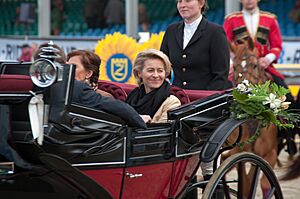
Minister for Defence (2013–2019)
In December 2013, Ursula von der Leyen became Germany's first female defence minister. This was a very important role. She was the only minister who stayed in Angela Merkel's government from 2005 until 2019. She was seen as a strong leader in the NATO community.
Handling International Situations
As Defence Minister, von der Leyen visited German troops in Afghanistan several times. She oversaw the process of German soldiers leaving the country. In 2014, she helped Germany decide to send aid to Kurdish fighters. She also worked on Germany's commitment to international efforts against groups like ISIL. At a conference in 2015, she explained why Germany chose not to send weapons to Ukraine at that time. She believed that talking was better than sending more weapons. She also spoke about the European migrant crisis in 2015, saying that some actions taken by countries were not acceptable. Under her leadership, Germany sent soldiers to Mali to support a UN peacekeeping mission.
Improving the Armed Forces
In June 2014, von der Leyen introduced a plan to make the Bundeswehr (German armed forces) more appealing to new recruits. This included offering childcare for soldiers' children. Germany also increased its defence spending starting in 2015. This allowed the Defence Ministry to modernize the army. Plans were made to get new equipment and increase the number of soldiers. By 2017, she announced that the number of professional soldiers would grow. She worked to improve cooperation between the German army and the armies of other countries, like the Netherlands, Czech Republic, and Romania. This was part of an effort to strengthen European defense.
Managing Military Purchases
In 2014, von der Leyen focused on improving how Germany bought military equipment. She worked to control costs and delivery times for large projects. She also spoke out when companies like Airbus had delays in delivering military transport planes.
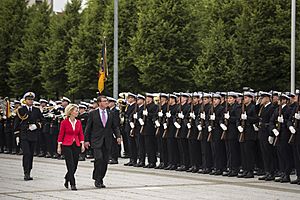
Arms Exports
During a visit to India in 2015, von der Leyen supported a project for India to build submarines with German help. She also supported Germany's decisions on selling arms to countries like Saudi Arabia and Turkey in 2019.
Her Role in the CDU Party
Ursula von der Leyen was an important member of the CDU party leadership. She was elected to the CDU executive board in December 2014. For several years, many people thought she might become the next Chancellor of Germany. From 2018 until she became President of the European Commission, she was also considered a top choice to become the head of NATO.
Leading the European Commission
Ursula von der Leyen became the President of the European Commission on 1 December 2019. She was the first woman to hold this important position. Her nomination was approved by the European Parliament in July 2019.
Key Actions in 2019
When she started her role, she focused on important goals for Europe. One of her goals was to make progress in fighting cancer. She also supported a trade agreement between the European Union and Mercosur countries.
Key Actions in 2020
In March 2020, during the COVID-19 pandemic in Europe, she spoke about travel restrictions. She said that while some controls might be needed, general travel bans were not always the best solution. She supported the EU's decision to place sanctions against Belarus. This happened after protests in Belarus and a civilian aircraft was diverted. She also discussed the situation between Greece and Turkey regarding maritime zones.
Key Actions in 2021
In September 2021, she commented on a defense agreement between the U.S., the UK, and Australia. She called the way France was treated "unacceptable." Europe faced rising energy prices in 2021. Von der Leyen said that Europe needed to rely less on gas imports and switch to clean energy faster. During a difficult time between Israel and Palestine, she said that attacks by Hamas were wrong and that civilians on both sides needed protection. In December 2021, she talked about the importance of COVID-19 vaccinations.
Key Actions in 2022
In 2022, European Commission President Ursula von der Leyen said that Ukraine should become a member of the European Union. She visited Kyiv in April 2022 to show support for Ukraine. She promised to work towards Ukraine joining the EU. In May 2022, she announced that the European Union would try to stop importing Russian oil and gas. She said Europe needed to be independent from Russian energy. She also supported the idea of changing how the EU makes foreign policy decisions, to make them faster. In August 2022, she highlighted the importance of the EU's system for reducing carbon emissions.
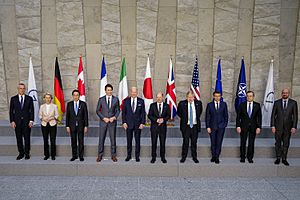
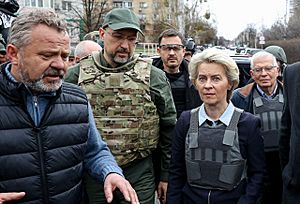

Key Actions in 2023
In April 2023, she celebrated Israel's Independence Day. In July 2023, she visited the Philippines and discussed human rights. In October 2023, she spoke about the military operation by Azerbaijan in Nagorno-Karabakh. She stressed the need to respect Armenia's territory. During the Gaza war, she condemned the Hamas attack on Israel. She also announced that humanitarian aid to Gaza would be increased. In December 2023, she visited Egypt and discussed the "strategic partnership" between the EU and Egypt with Egyptian President Abdel Fattah el-Sisi.
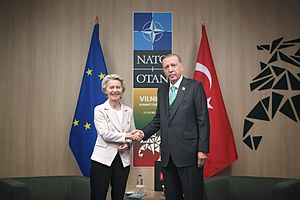
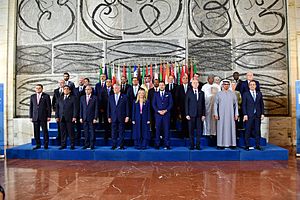
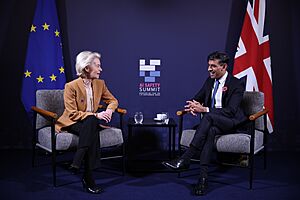
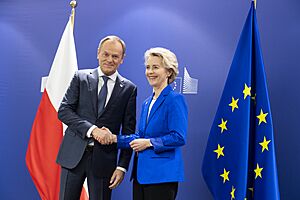
Thinking About Economic Growth
In May 2023, Ursula von der Leyen spoke about economic growth. She said that focusing only on GDP (a measure of a country's economy) was not enough. She believed that a growth model based on fossil fuels was outdated.
Addressing Migration Challenges
In 2022, Europe saw many people arriving without permission. Von der Leyen worked on agreements to manage migration. In September 2023, she visited the Italian island of Lampedusa to see the situation with many migrants arriving there.
Key Actions in 2024
In March 2024, Ursula von der Leyen was chosen again as the candidate for President of the European Commission. In April 2024, she praised the new EU Asylum and Migration Pact. This plan helps manage how migrants are shared among EU countries. On 18 July 2024, she was re-elected for a second five-year term as President of the European Commission. In late 2024, she became a supporter of nuclear power. She continued to prioritize the European Green Deal and the shift to cleaner energy.

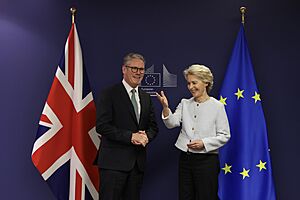
Key Actions in 2025
On 26 February 2025, the European Commission announced a plan called the Clean Industrial Deal. This plan provides 100 billion euros to support clean manufacturing in the EU. On 4 March 2025, von der Leyen announced an 800 billion euro plan called "ReArm Europe" to invest in defense. She suggested that EU countries might need to adjust their rules about national debt to allow for more defense spending.
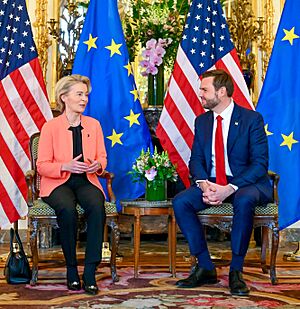
Other Important Roles
Ursula von der Leyen is part of the German branch of the European Movement. She has also been a member of several important groups and boards:
- She was on the board of trustees for the Total E-Quality initiative.
- She was a member of the board for the Mädchenchor Hannover (a girls' choir).
- She was on the Board of Trustees for the World Economic Forum from 2016 to 2019.
- She was a co-chair for the World Economic Forum on the Middle East and North Africa in 2017.
- She was on the Advisory Council for the Munich Security Conference from 2013 to 2019.
- She was on the Board of Trustees for the 2011 FIFA Women's World Cup from 2010 to 2011.
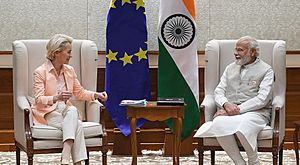
Her Political Ideas
Supporting Families and Children
As Minister for Family Affairs, Ursula von der Leyen worked to create more childcare options across Germany. She also introduced a paid parental leave program. This program allowed both mothers and fathers to take time off work after a child's birth.
Promoting Women in Leadership
In 2013, von der Leyen supported the idea of having more women on the boards of companies in Germany. She wanted to see a certain percentage of women in these important leadership roles.
Germany's Role in the World
Ursula von der Leyen believes Germany should play a strong role in international affairs. In 2014, Germany decided to send aid to forces in Iraq. This was a new step for Germany. She has also discussed the relationship between Europe and Russia. She believes that economic ties are important. She supported working closely with countries like Saudi Arabia on security matters. In 2016, during a visit to Saudi Arabia, she chose not to wear a hijab. She said she did not like it when women were forced to wear certain clothing. She also commented on the importance of supporting democracy in countries like Poland. She has spoken about energy supply, stating that Germany aims to have diverse and independent energy sources.
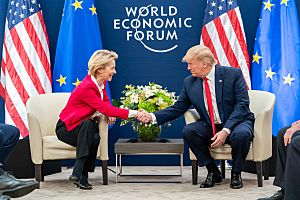
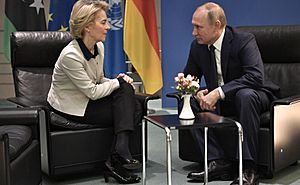
Working for European Unity
Von der Leyen has often spoken about her vision for a more united Europe. She believes that European countries should work closely together on important issues like finance and economics. She has also suggested that a combined European military force could be a long-term goal. After the United Kingdom left the European Union (known as Brexit), she said that Brexit had made it harder for Europe to work together on security. In 2019, she emphasized the need for strong leadership in Europe and for increasing spending on foreign policy. In 2023, she met with the President of the UAE to discuss trade and cooperation.
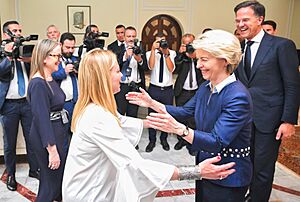
Human Rights Discussions
In April 2023, Ursula von der Leyen and French President Emmanuel Macron discussed human rights in China during their visit there. They shared their concerns about the treatment of certain groups and the freedoms in Hong Kong.
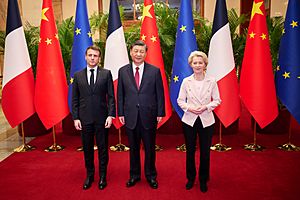
Protecting the Environment
She has strongly supported the European Green Deal. This plan aims to make the EU climate neutral by 2050. She has also spoken about the competition in the electric car market, noting that some countries offer large government support to their car industries.
Publications
- Ursula von der Leyen, C-reaktives Protein als diagnostischer Parameter zur Erfassung eines Amnioninfektionssyndroms bei vorzeitigem Blasensprung und therapeutischem Entspannungsbad in der Geburtsvorbereitung, doctoral dissertation, Hannover Medical School, 1990
- Ursula von der Leyen, Maria von Welser, Wir müssen unser Land für die Frauen verändern (in German). C. Bertelsmann Verlag, Munich, 2007. ISBN: 978-3-570-00959-8.
- Ursula von der Leyen, Liz Mohn, Familie gewinnt (in German). Verlag Bertelsmann Stiftung, Gütersloh, 2007. ISBN: 978-3-89204-927-2.
Honours and Awards
Foreign Honours
Honorary Degrees
- 2023 – Honorary Doctorate, Université Toulouse Capitole
- 2022 – Honorary Doctorate, Ben-Gurion University of the Negev
Other Awards
- 2019 – Forbes' list of the World's 100 Most Powerful Women, position 4
- 2020 – Forbes' list of the World's 100 Most Powerful Women, position 4
- 2020 – Global Citizen Prize for World Leader
- 2022 – BBC 100 Women
- 2022 – Global Goalkeeper Award, presented by the Bill & Melinda Gates Foundation's Goalkeepers program
- 2022 – Forbes' list of the World's 100 Most Powerful Women, position 1
- 2023 – Forbes' list of the World's 100 Most Powerful Women, position 1
- 2024 – Forbes' list of the World's 100 Most Powerful Women, position 1
See also
 In Spanish: Ursula von der Leyen para niños
In Spanish: Ursula von der Leyen para niños


